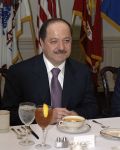Baghdad faces challenges from the Kurdish autonomous region, as development of western oil reserves relies on good relations with Erbil, as well as Ankara.
Few can deny the tremendous developmental potential Iraq’s oil reserves provide to its people. Ten years on from the American invasion, Iraqi production is now among the largest in OPEC. At 3m barrels per day (bpd) this is the highest level of production we have witnessed from the war-torn nation since 1990, and not far from its peak 1979 levels of 3.5m bpd. With reserves recently being revised 5% higher to 150m bpd, and the west of Iraq largely remaining unexplored, it is easy to view Iraq’s resource wealth with great optimism.
But projecting Iraqi oil production into the future, and the benefits that this will bring to economic growth, is fraught with difficulty. The International Energy Agency (IEA) report projects three different scenarios by 2020, with production between 4m-9m bpd. While these scenarios fall short of official estimates of 10m-12m bpd, they provide us with three distinct versions of Iraq’s future. The version that prevails will largely be contingent upon rectifying internal political fractures within an evolving external geopolitical environment.
Divisions between Baghdad and the Kurdistan Regional Government (KRG) in Erbil run deep. In April 2012 the KRG halted oil shipments through Iraq’s national pipeline, instead opting to truck out its crude oil over the Turkish border. Earlier this month Iraqi Kurdistan completed its first shipment of crude oil to international markets, with a 30,000 tonne cargo from Genel Energy’s Taq Taq oil field. The KRG is also moving forward with plans to finalize a pipeline into Turkey, which would dramatically increase its export capabilities at a time when the national network is at capacity and servicing exports south through Basra remains problematic.
Meanwhile, Baghdad has denounced the Genel Energy sale as unconstitutional. Iraqi Oil Minister Abdul Kareem Al-Luaibi has threatened to sue Genel Energy and any other company that participates in exporting crude from Iraqi Kurdistan. This is particularly damaging to Western multinationals with concessions in southern Iraq’s oil fields, which are now effectively embroiled in a domestic political dispute. Al-Luaibi also reserved harsh words for the Turkish government, claiming that any side agreement with the KRG, such as the proposed KRG-Turkey pipeline, would threaten the 15-year accord Ankara signed with Baghdad.
To view such a domestic dispute as mere politicking would miss a deeper point. The Erbil-Baghdad split is representative of the deep nexus between oil revenue sharing, Kurdish statehood, and Iraqi unity. The KRG Minister of Natural Resources Ashti Hawrami has posed the Kurdish position as such:
“We wish to remain part of a democratic and federal Iraq, but given the country’s troubled history of authoritarian rule, we believe a decentralized oil policy and the sharing of power and wealth is essential to Iraq’s unity.”
This is ominous of a future push for Kurdish statehood, and leaves Baghdad in a difficult position. Should it continue to seek to centralize control it risks emboldening Kurdish resource nationalism. Yet, decentralization poses its own challenge of closer ties between the KRG and Turkey, and could better position the Kurds to pursue independence down the road.
Either situation could further delay Iraq’s development, and must be dealt with proactively. How Baghdad deals with Erbil will determine what governance in Iraq looks like, and how structured or chaotic growth is moving forward. That all this is occurring under the backdrop of broader regional tensions, particularly over diverging views towards Syria between Iraqi Prime Minister Nouri Al-Maliki and Turkish Prime Minister Recep Tayyip Erdogan, only serves to strain relations further. This deeply complicates Iraq’s geopolitical situation moving forward, as it seeks to balance its various interests with Turkey, the West, and Iran. One option would be to diversify export capabilities south and west, and Baghdad already appears to be doing this with reports of an $18bn oil pipeline through Jordan down to the Gulf of Aqaba.
There does remain a silver lining. To their benefit, the Kurds note that they prefer accommodation with Baghdad to independence. While this may just be political hedging, it is an important point to make. A unified Iraq, with a comprehensive national oil program, is better able to leverage Iraq’s tremendous resources with respect to negotiating concession rights and coordinating large infrastructure projects. Additionally, Erbil recognizes that its reserves are the oldest and fastest depleting in Iraq, and that the majority of increased Iraqi capacity will actually come from the south. In the long run, it would be in its interests to be part of a comprehensive national revenue-sharing program, constitutionally enshrined, which would ensure its prosperity. Ultimately, all parties are better off with a smaller slice of a much larger pie.
Iraq’s potential is undeniable. It has the reserves to truly transform itself in the region, and to finally emerge from decades of strife as a healthy and viable state. The IEA report clearly envisions this for Iraq, but balances this against Iraq’s precarious political situation. How Iraq grows will rely on navigating a course between choppy domestic waters and a perilous external environment.











